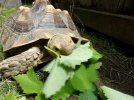a smaller container , imo, is a good idea for an ill reptile ,not because they get lost , but because they may not thermoregulate properly..... a small container can be kept entirely at the same temperature.....
red foots habitat is not deep shaded forest .... thick forest are actually a genetic barrier to redfoot tortoises , there are 4-5 genetically distinct clades of redfoots , not the case with yellowfoot tortoises........ i kept redfoots outside in ohio end of may through end of september , easily for 10 plus years, they "bask" as much as my eastern box turtle do...... just provide cover , they do like to bask under cover ........
"They live in savannahs to forest-edges, forest clearings, or along waterways. They appreciate habitats with temperatures close to 30 °C. Red-footed tortoises are often found in or near transitional areas between forests (rain forests, dry forests or even temperate forests) and savannah, such as forest clearings, wood edges, or along waterways (Moskovits, 1985)."
red foots habitat is not deep shaded forest .... thick forest are actually a genetic barrier to redfoot tortoises , there are 4-5 genetically distinct clades of redfoots , not the case with yellowfoot tortoises........ i kept redfoots outside in ohio end of may through end of september , easily for 10 plus years, they "bask" as much as my eastern box turtle do...... just provide cover , they do like to bask under cover ........
"They live in savannahs to forest-edges, forest clearings, or along waterways. They appreciate habitats with temperatures close to 30 °C. Red-footed tortoises are often found in or near transitional areas between forests (rain forests, dry forests or even temperate forests) and savannah, such as forest clearings, wood edges, or along waterways (Moskovits, 1985)."
